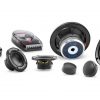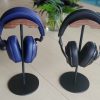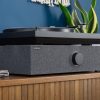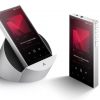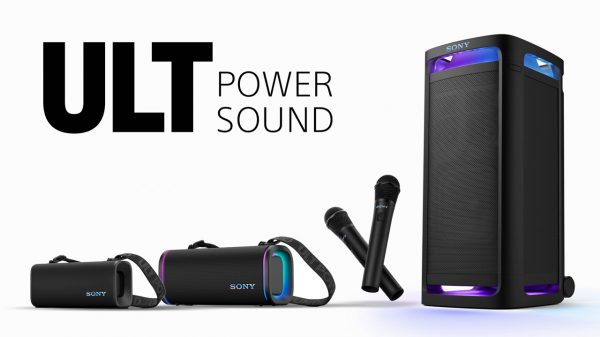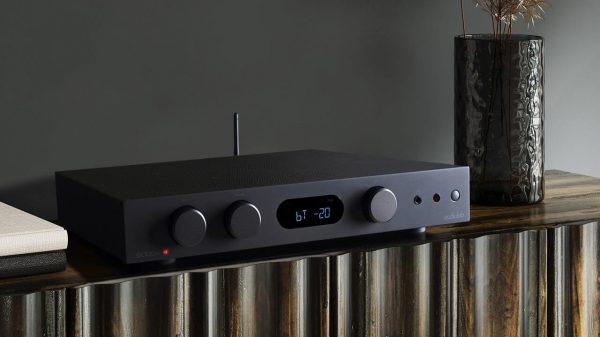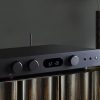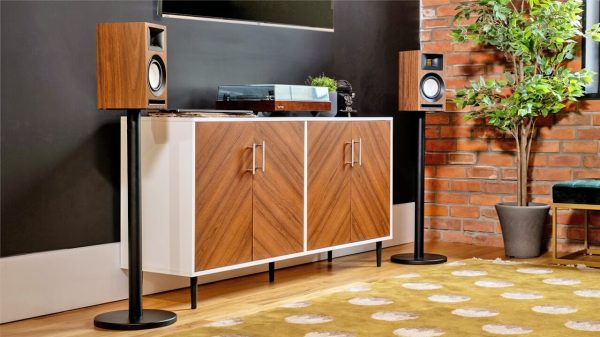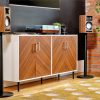Simply one of the best sounding Bluetooth speakers you can buy
Pros
- Great sound and bass
- Top-notch build quality
- CSR aptX improves Bluetooth audio fidelity
- 30-day money back return policy
- Unique design
Cons
- Bluetooth pairing only accepts one device at a time
- Bluetooth re-connection issues
- 3.5mm cable not included
The Wren V5BT is a $400 table-top wireless speaker, available in rosewood or bamboo, that plays music from any Bluetooth enabled smartphone. It is essentially the universal model, which follows two identical looking and priced speakers designed specifically for Apple (V5AP) or Android (V5PF) devices, respectively. The beauty of Bluetooth stereo is that it provides the broadest compatibility along with minimal setup. However, there are some drawbacks that may lead you to buy one of Wren’s other products that I’ll discuss later.

Background
Wren Sound Systems (http://wrensound.com) was founded in 2011 by Mike Giffin, a 35-year industry veteran who had a long career at Harman International. Mike says, “Wren has set out to raise the bar on [wireless] sound quality without being snobby or excessively priced, by offering speakers that look as good as they sound. We are trying to revive build-quality as an important aspect of speakers. There’s a lot of plastic junk out there.”
“The shape of the Wren V5 serves both a functional and an aesthetic purpose: an asymmetrical space greatly reduces the likelihood of peaks and nulls at frequencies where the wavelength is either reinforced or cancelled when it reflects back from a boundary (wall, ceiling, floor, etc.). This is why music halls and recording studios are designed asymmetrically-to prevent peaks, nulls and standing waves. As ideal loudspeaker design is one that, to the greatest extent possible, makes the enclosure “disappear” sonically. In addition to as asymmetrical design, a speaker enclosure’s effect on the sound in neutralized by the use of rigid, acoustically dead material (like MDF, which is what Wren uses), by internal bracing to reinforce rigidity, and by the use of damping material to absorb vibrations transmitted from the speaker system to the surface upon which it rests. The overall shape, by the way, also reinforces rigidity. All of these audio “best practices” are used in the Wren V5. Because of the expense of the materials — MDF (vs. plastic), real wood veneers, internal bracing, a difficult-to-make cabinet shape, and a 4mm low durometer silicon damping pad covering the entire bottom surface — they are rarely found on wireless speakers selling for less than $700 and up,” said Mr. Giffin.
Getting Started
 The Wren V5BT was simple to setup and operate. There are four buttons on the side (power, volume up, volume down, and source), and a Bluetooth setup button located on the rear. To initiate Bluetooth pairing you hold down the Bluetooth button for a few seconds, then look for “Wren Speaker” to appear on your device’s Bluetooth discovery screen. Once you tap to connect, you can switch over to any music app to start playing audio through the speaker.
The Wren V5BT was simple to setup and operate. There are four buttons on the side (power, volume up, volume down, and source), and a Bluetooth setup button located on the rear. To initiate Bluetooth pairing you hold down the Bluetooth button for a few seconds, then look for “Wren Speaker” to appear on your device’s Bluetooth discovery screen. Once you tap to connect, you can switch over to any music app to start playing audio through the speaker.
Connecting your first device is easy, but connecting multiple devices at the same time is not possible due to limitations of the Bluetooth codec. So you might find yourself re-pairing often, if you have a household of devices that want to stream to the speaker. As long as the paired device remained within range (about 30 feet or 10m), Bluetooth remained connected. However, when I left the house (or went out of range), the speaker would not automatically sync up again to my iPhone 5s. Of course manually re-pairing got things connected again.
Another quirk Bluetooth speaker buyers should be aware of is phone calls and sounds are also broadcast through the speaker when paired. Granted, this issue is not specific to the V5BT, I thought it was worth mentioning for iPhone owners. However, some Android smartphones have separate settings for “media audio” vs. “phone audio” that prevents the problem. Unfortunately, I did not test with any Android devices.
Features & Usability
All Wren V5 speakers use an Intersil D2 Audio DSP controlled stereo class D amplifier with 25 watts-per-channel of real power (50 watts total), two 3-inch throw drivers with 4-layer voice coils augmented by stereo bass-reflex design, and two 3/4-inch edge-driven wide dispersion soft dome tweeters. The speakers only differ by their use of wireless protocols. The V5BT includes CSR’s aptX technology which is said to provide better audio quality than the A2DP (stereo Bluetooth) profile. However, your source device must support aptX (check compatibility) to gain any sonic benefit, and interestingly no Apple products currently support aptX.

Designwise there is nothing that causes confusion. Once powered on, you can change the volume or source. The buttons are clearly labeled. A USB port is available on the back of the speaker, but it is only for device charging. A 3.5mm “AUX IN” jack provides wired listening via headphone cable (3.5mm cable not included). After 30 minutes of inactivity, the speaker goes into power-save mode to comply with Energy Star standards.
The V5BT only allows one Bluetooth device connection at a time. That basically means no multi-room capability. However, the DTS Play-Fi (Android) speaker can play up to 8 speakers at one time provided you have an 802.11n router and the AirPlay (Apple) speaker can play up to four speakers at once provided you are using iTunes on a Mac or Windows PC.
Music Listening
Despite the known drawbacks of stereo Bluetooth, I was quite pleased how well the Wren V5BT sounded. Bass was smooth and room-filling, with a depth and quickness that made it hard believe such sound came from 3-inch drivers and 3/4-inch tweeters. The speaker brought out the airy details of music that made it easy to listen to for extended periods. I’d describe its sound as well balanced and energizing, with an aural presentation that is potentially best in its class. And yes, it can play loud without for those that want to have a dance party.

Technical Stuff
Users looking for the utmost audio fidelity might consider either the DTS Play-Fi or AirPlay versions of the Wren V5. Both offer lossless audio transmissions over Wi-Fi, which simply means better sound, because the wireless audio signal is not truncated. However, to take advantage of lossless listening you need an existing Wi-Fi home network and digital music files stored in a lossless format. Wren founder, Mike Giffin further explains the differences and advantages of wireless audio technologies:
“As powered speaker devices, all Wren V5’s offer identical audio performance. However, the level of fidelity that the speaker can “put out” is limited by the level of fidelity of the digital file “put in.” Many if not most users store their music in MP3, which is a compressed digital format. “CD-quality” music is 16 bit / 44.1 kHz. However, there are higher resolution formats available — the most visible on the audiophile scene is Hi-Res, which establishes 24 bit/ 96 kHz as the baseline minimum. The higher the resolution, the more musical detail you will hear. Both the V5AP and the V5PF are Wi-Fi-based devices and are “lossless” — that is, the signal sent to the device is the signal that is processed, so you will hear higher resolution files in all their glory. This is not true for the Bluetooth speaker. Bluetooth was originally developed to specialize in low-power, short-distance communication between devices. Low power is important if you want to talk for hours on the phone while paired to a Bluetooth headset or to a Bluetooth input in your vehicle’s audio system for hands-free communication. One way the Bluetooth conserves battery power is by compressing the music signals, which renders the technology “lossy” (“missing detail”) as opposed to lossless protocols like AirPlay and Play-Fi. Another way Bluetooth conserves power is by limiting transmission range to about 30 feet. Despite this limitation, Bluetooth is the most popular wireless audio format today because people are familiar with it, it is simple to operate, and it outputs any audio produced on your device.”
Conclusion
Wren V5BT produces astonishingly good sound for a competitive price. Its use of high-grade components and detailed sound make it easy to recommend for wireless listening. Although, the audiophile in me would have me yearning for the AirPlay V5AP speaker since I predominantly use Apple devices. However, if you’re willing to overlook Bluetooth connectivity issues and just want great hi-fidelity sound from a nice looking, well built wireless speaker, the Wren V5BT would be hard to beat.



